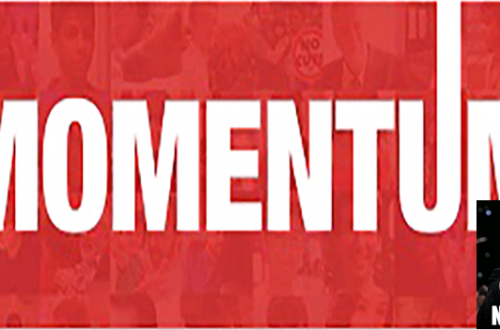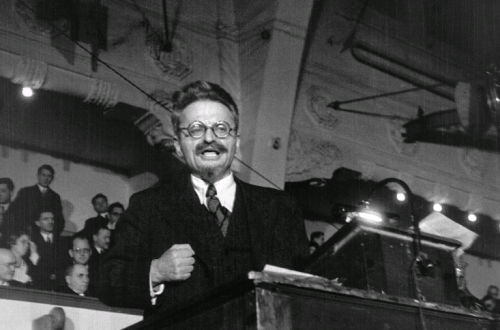Why would president Donald Trump casually imply that a spate of recent attacks and threats made against Jewish Community Centres in the US are false flag operations? It certainly sounds like an antisemitic trope. A promise that this inchoate theory would be elaborated during his address to Congress went unfulfilled and observers were left none the wiser.
At this point Trump’s serial defenders, sympathizers, and apologists will usually mention that he has a Jewish daughter to whom he is clearly devoted and a Jewish son-in-law he evidently likes and trusts. Trump’s pro-Israeli bona fides will be marshaled in his support with Netanyahu as a character witness to Trump’s apparently impeccable philosemitic credentials. And right-wing Jewish voices will translate his words into something benign and accuse anyone who interprets what he said otherwise of ‘smears’ and a partisan lack of charity. It will also be noted at some point during this ever-more familiar process that those on the Left accusing Trump or his administration of antisemitism have a lot of nerve given the Left’s inglorious recent history in such matters.
Today’s febrile environment can make sober assessment of incidents like this one difficult. Umbrage on the Right is in part an expression of garden-variety tribalism in a polarized political environment, but it also seems to be a consequence of a changing ideological landscape. The Right has become accustomed to occupying the moral high ground on antisemitism and is in no mood to surrender it. This has, in turn, made it slow to identify and quick to minimize growing evidence of antisemitism in its midst. On the other hand, Trump’s clumsy impulsivity is often matched by reflexive outrage on the part of his opponents, who seldom stop to consider a charitable interpretation of whatever he’s just said and done. It is usually worth contemplating other explanations before reaching – and possibly overreaching – for an antisemitism accusation since false alarms serve no-one.
A number of commentators inferred from Trump’s characteristically vague ruminations about the JCC threats that he was blaming Jews for staging the attacks, but this was not in fact made explicit by Trump himself. Earlier in the day, an informal advisor to the president, Anthony Scaramucci, had speculated that the Democrats were behind them (an allegation he has since partially walked back), and it is more likely that Trump was echoing this suspicion. It is also worth noting that there have been a series of reports of people fabricating racist attacks in what appear to be attempts to implicate Trump supporters. Nevertheless, there is not, as far as I know, any evidence to suggest that the threats made against American JCCs are themselves fabricated and, consequently, Trump’s speculations to that effect sound fantastically insensitive and irresponsible.
Trump’s reflexive suspicion is not specific to these incidents, however – it appears to be a character trait informing (or informed by) a generally paranoid worldview. During the election campaign, intelligence officials were bewildered by his refusal to credit allegations of Russian interference and this led some observers to conclude that Trump was covering for Putin. But it also looked like an attempt to push back against those he suspected were attempting to discredit his support with politically-motivated allegations. The same could be said of Trump’s sluggish disavowal of David Duke and the alt-right. Putin, Duke, and Richard Spencer had flattered him so why should he denounce them just because people who only ever seemed to criticize him demanded it?
This sense of embattled indignation is compounded by Trump’s generally conspiratorial mindset. Trump aggressively promoted the ‘birther’ lie, he gives credence to vaccine alarmists, he has speculated that global warming is a Chinese-concocted hoax, and he gets at least some of his understanding of current events from cranks like former advisor Roger Stone and Alex Jones at InfoWars. It should not be surprising that he sees enemies and plotters lurking everywhere, nor that his default understanding of reality is that nothing is as it appears to be.
Trump first floated the possibility that the uptick in antisemitic incidents following his election was the work of his opponents when he excoriated a Jewish journalist who he thought was accusing him of antisemitism (even though the journalist in question had taken pains to stress that was not his intention). Still smarting from an election result that had not been as decisive as he might have liked, and from derisive media reporting of his inauguration attendance, Trump sensed another attempt to tarnish his victory with racism, and so he lashed out at both his interrogator and the unseen hand of political enemies. The encounter certainly looked terrible, but is that enough to infer a specifically anti-Jewish animus?
If Trump perceives vandalized cemeteries and antisemitic threats as part of a wider conspiracy of hacks and leaks designed to discredit his embattled presidency, then it is not necessary to invoke antisemitism to understand his response. The ethnicity of the actors in this reading is secondary – the hostility to Trump is paramount. This points to a candidate whose distrust and delusion make his presidency a fraught and dangerous prospect – conspiracism by definition deforms the conspiracist’s rational comprehension of reality. But it is not a prospect necessarily driven by bigotry.
And yet…even if one accepts all the above, the Trump administration’s attitude to Jews remains very odd. Why the pointed omission of any reference to the genocide of Europe’s Jews in the administration’s Holocaust Memorial Day statement, and why the stubborn refusal to concede any criticism on this point? Here was an unforced error that the administration insisted was not an error at all, and it was hard to escape the feeling that a marker was being put down. For whose benefit or for what purpose remains obscure, but the tenacity with which the administration clung to its position was bizarre. And whatever the reason for Trump’s apparent hesitancy in condemning antisemitism, and his insistence in quarreling over responsibility, the optics are dire, not least because concern for those terrorized by a rise in Jew hatred is so clearly subordinated to the need to attack perceived foes and protect his own reputation.
Those on the Right, complacent in their assumption that antisemitism is a problem confined to the Left, should remain vigilant. Tortuous explanations for Trump’s behavior will become less and less persuasive the more they have to be offered. It is profoundly concerning to hear the president of the United States use his position to circulate baseless conspiracy theories, whatever the deeper motivation or purpose. Doing so lends authority and credence to what ought to be fringe notions and obsessions, and excites the prejudices of his more radical supporters, such as the former Klansman David Duke and his followers who are not at all hesitant to accuse Jews of fabricating victimhood.
Even if Trump’s present behavior can be satisfactorily explained without recourse to a bigotry diagnosis, there is no guarantee things will stay that way, particularly if he suspects that reports of antisemitic incidents are being used to torment and discredit him. Conspiracism and antisemitism are rarely discrete categories. Antisemitism, after all, is itself a conspiracy theory for which paranoid minds like Trump’s are extremely fertile soil. Instead of accusing Trump’s critics of bad faith when accusations of prejudice arise, or using his pro-Israeli positions and Jewish relatives as a shield, his supporters would do well to bear this in mind.


